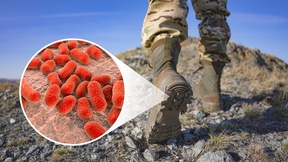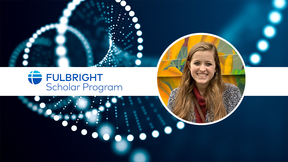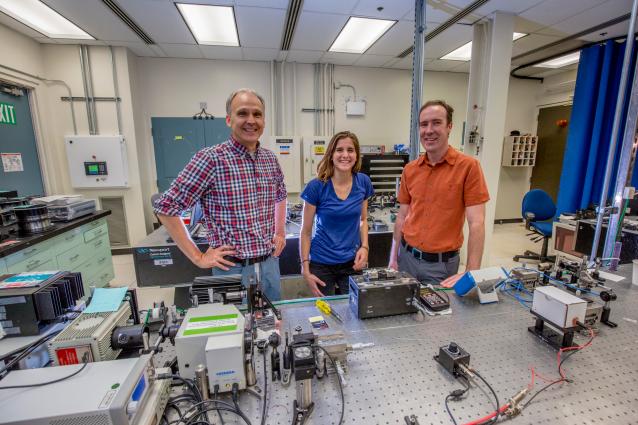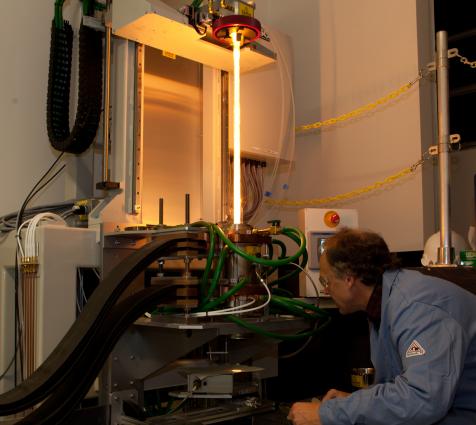Summer scholar purifies water with fibers
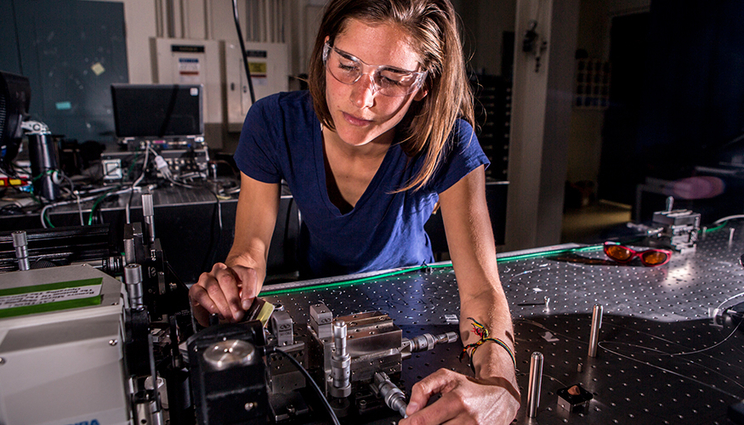 (Download Image)
Mariana Lanzarini-Lopes at work in the NIF & Photon Science Fiber Laser Lab at Lawrence Livermore National Laboratory. Photos by Jason Laurea/LLNL
(Download Image)
Mariana Lanzarini-Lopes at work in the NIF & Photon Science Fiber Laser Lab at Lawrence Livermore National Laboratory. Photos by Jason Laurea/LLNL
It all started for Mariana Lanzarini-Lopes as an undergraduate, cracking coconuts in the West Indies, seeing the effects of dysentery while working in a hospital in Africa and engineering a solar-powered refrigerator to keep medicine safe in Indian villages.
This was the path that led the doctoral student in environmental engineering to join the fight to solve one of the planet’s greatest problems -- sustainability of clean water. And it brought her to Lawrence Livermore National Laboratory's NIF and Photon Science Directorate as a NIF & PS Summer Scholar, where she is seeking a new high-tech solution to the problem through the use of optical fibers for water purification.
Lanzarini-Lopes works with mentors Mike Messerly, the Fiber Laser Group leader, physicist Graham Allen and A.J. Simon, the LLNL Energy Group leader, along with Paul Westerhoff, her Ph.D. adviser at Arizona State University School of Sustainable Engineering and the Built Environment.
Her purified-water concept is quite practical, in Lopes’ view: "Think of a basic stream you drink directly from," she explained. "You seek the shallow end, because that gets the most sunlight," which helps to disinfect the water.
Her project builds on the sunlit-stream principal by shining ultraviolet (UV) light on contaminated water through a thin strip of silica fiber optic about one meter long. The light excites photocatalysts for nitrate and organics removal and inactivates bacteria and viruses, purifying the water.
"My summer goal is better UV emissivity along the length of the fiber," Lanzarini-Lopes said. She will coat the fiber with special water-resistant chemicals, including titanium dioxide, to test how bacteria react and ensure that water purification occurs after light treatment. "I don’t want anything to have UV absorption except my titanium dioxide or bacteria that I’m treating," she said.
Lanzarini-Lopes’ passion for clean-water research was born while pursuing her chemical engineering degree from the University of Dayton. Her family had settled in Ohio after leaving her native Sao Paolo, Brazil, when she was in middle school. At Dayton, she earned summer internships in Zambia in southern Africa, teaching physics and working at a hospital where she saw first-hand the toll of water-borne disease, especially in children.
In an ancient region of India on the Ganges River, in the east-central city of Patna, Bihar, she worked on a university-sponsored solar-powered refrigeration project. And on the West Indies island of Dominica, she engineered better processing for coconut-oil production. While all her stays were in modest quarters, what struck her most was the contrast in the quality of life for the people around her: it wasn’t the terrain, the lifestyle or the climate, but water quality that made the difference.
"I lived in these areas where people didn’t have a lot," she said, "yet their quality of life was so much better in Dominica because they had pure water to drink, to grow food in and play in. They understood that, and it mattered to them." She realized the impact clean water could make on a large scale, and set out to make water quality her life’s work.
Lanzarini-Lopes’ project this summer, funded by the Laboratory Directed Research and Development program, is to characterize the fibers drawn from the Lab’s fiber draw tower, which can fabricate customized fiber with pure silica of varying degrees of porosity, depending on the scale and diameter needed. It’s the next step toward proof of principal in her personal research. Once back in her lab at Arizona State, where she has built a larger-scale testing container, she will use the fibers to process ultraviolet light to purify water; the results from her Livermore research will help with her doctoral dissertation.
While her passion has been sustainability, and she has devoted all her summers to pursuing internships to further that cause, Lanzarini-Lopes does admit to spending some downtime playing ultimate Frisbee — a sport played by teams of seven on soccer-sized fields. While the game may have been born in the counterculture days, she takes her fun seriously, playing for Rubix, a competitive Phoenix traveling team.
After completing her Ph.D., Lanzarini-Lopes plans to get a job to gain experience — internationally if possible, as she speaks Portuguese and Spanish in addition to English — and she has strong interest in the field of electrochemistry for water treatment. And as for the future? "I might go into teaching eventually," she mused. "When I’m older."
-Lisa Petrillo
Contact
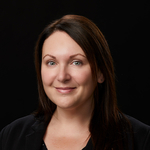 Breanna Bishop
Breanna Bishop
[email protected]
(925) 423-9802
Related Links
NIF and Photon Science DirectorateArizona State University School of Sustainable Engineering and the Built Environment
Tags
Lasers and Optical S&TLasers
National Ignition Facility and Photon Science
Physical and Life Sciences
Featured Articles
